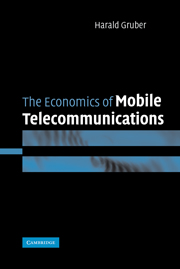Book contents
- Frontmatter
- Contents
- List of figures
- List of tables
- Preface
- List of abbreviations and acronyms
- 1 Introduction
- 2 Stylised features of the mobile telecommunications industry
- 3 The evolution of national markets for cellular mobile telecommunications services
- 4 The determinants of the diffusion of cellular mobile telecommunications services
- 5 Market conduct and pricing issues in mobile markets
- 6 Issues in radio spectrum management
- 7 The evolution of market structure in mobile telecommunications markets
- Appendix
- Bibliography
- Index
7 - The evolution of market structure in mobile telecommunications markets
Published online by Cambridge University Press: 22 September 2009
- Frontmatter
- Contents
- List of figures
- List of tables
- Preface
- List of abbreviations and acronyms
- 1 Introduction
- 2 Stylised features of the mobile telecommunications industry
- 3 The evolution of national markets for cellular mobile telecommunications services
- 4 The determinants of the diffusion of cellular mobile telecommunications services
- 5 Market conduct and pricing issues in mobile markets
- 6 Issues in radio spectrum management
- 7 The evolution of market structure in mobile telecommunications markets
- Appendix
- Bibliography
- Index
Summary
Introduction
As seen in chapter 6, market entry in mobile telecommunications is based on a licensing process for scarce spectrum resources. Whereas initially the assignment of licences was based on administrative procedures, there is a trend towards market-based mechanisms such as auctions. All European countries assigned radio spectrum for the provision of 3G mobile telecommunications services around the years 2000–1. The licence assignment procedures varied across countries, but the majority made recourse to auctions. Auctions were an innovative method and produced several surprising results. Unexpectedly high licence fees were observed in some countries, whereas in others they were far below expectations. Some of these outcomes, especially the disappointing ones, were explained to some degree by differences and inconsistencies in auction design. But several points still beg an explanation, especially the high licence fees. However, the administrative procedures also for licence assignments, such as ‘beauty contests,’ produced disappointing results on several occasions. The economists' typical argument in favour of an auction revolves around the assertion that it is a market-based mechanism, and hence best to select the agent with the highest willingness to pay (WTP). That would implicitly ensure that the most efficient use of a scarce public resource was made. However, the track record emerging from 3G licensing in Europe sheds some doubt on whether performance in attracting efficient firms has improved through auctions. For this purpose a close look is now taken at the actions of governments and firms in the aftermath of the 3G auctions in Europe.
- Type
- Chapter
- Information
- The Economics of Mobile Telecommunications , pp. 266 - 287Publisher: Cambridge University PressPrint publication year: 2005



